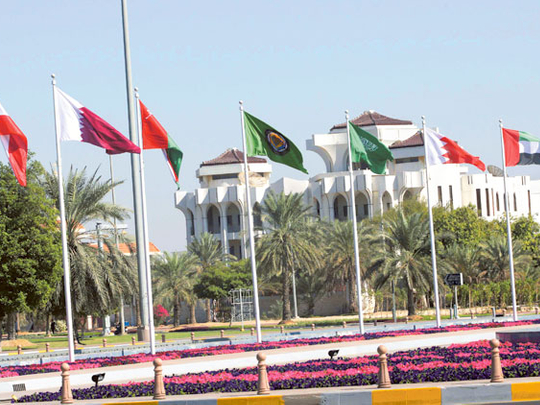
Dubai: When the leaders of the six members of the Gulf Cooperation Council (GCC) meet in Kuwait on Tuesday, Iran and its developing relations with western countries are likely to feature high on the summit agenda, Gulf analysts said.
The Iranian nuclear agreement with world powers and its political rapprochement with western countries are also expected to boost efforts of member states to strengthen their 32-year-old bloc and heed calls to transform the alliance into a Gulf union, analysts added.
But the proposal to develop the body into a fully-fledged union has proven divisive, with Oman threatening to leave the GCC if the idea materialises. The group also includes Saudi Arabia, Kuwait, Qatar, Bahrain and the UAE.
“The summit is held amid extremely sensitive and delicate situations that require member states to study the consequences for the GCC,” Secretary General Abdul Latif Al Zayani said ahead of the two-day summit.
“Tehran is trying to create a wedge between Saudi Arabia and some GCC states like Oman and Qatar,” said Saudi political analyst Khaled Al Dakhil .
“Undoubtedly, all the GCC summits, since their establishment [in 1981] were preoccupied with the Iranian neighbour,” said prominent UAE political science professor Abdul Khaleq Abdullah.
“The only constant issue that has not changed throughout the past thirty years is that Iran has been always present [on the agenda],” in the Arab Gulf summits, with varying degrees, he added, anticipating that the “Iranian issue will take a [considerable] length of time during the GCC summit in Kuwait”.
“Clearly, the Gulf-Iranian relations are going to come high on the agenda of the [GCC] summit in light of the developments after Iran achieved victory on the western powers in its nuclear programme,” said Saudi Politics professor at King Abdullah Aziz University in Jeddah Waheed Hamza Hashem in a phone interview with Gulf News.
Late last month, Iran and the six world powers reached an interim deal over Tehran’s nuclear programme following several years of on-and-off talks. The deal came nearly three months after the election of President Hassan Rouhani, who is largely viewed as more moderate than his predecessor Mahmoud Ahmadinejad. The nuclear deal also came after rare public contacts were made between senior Iranian and American officials in the past few months.
Shortly after announcing the deal, which the Arab Gulf countries welcomed with varying degrees, Iranian Foreign Minister Mohammad Javad Zarif made a regional tour that took him to Oman, Qatar, the UAE and Kuwait.
“They [Iranians] know that the nuclear agreement will be high on its agenda,” said Abdul Hamid Al Da’as, a veteran Kuwaiti journalist.
“They [Iranians] want Kuwait, which it has a good relation with, to play a role in calming down some of the fears [of other Gulf nations] ,” he told Gulf News in reference to the concerns the Gulf countries have from Tehran’s nuclear programme and the worries that the Iranian-Western rapprochement will come at their expense.
Tehran conveyed a message to Kuwait signalling that “they are open to strengthening relations with Gulf countries,” Da’as said. He expressed strong belief that Kuwait has conveyed the message to the Saudi leadership, and anticipated the summit will come out with a “conciliatory statement” in which it welcomes the nuclear agreement, but at the same time calls on Iran to show its good intentions – a position that Saudi Arabia has already taken. Riyadh has expressed its cautious reaction to the deal though it had welcomed it.
Apart from the Iranian-American rapprochement, Abdullah Ba’aboud, head of the Gulf Studies Centre at Qatar University, expects Gulf leaders to discuss the situation in Syria and ways to find a solution to it. Iran has been supporting the regime of Bashar Al Assad, while most GCC countries have sided with the opposition.
“There are differences in perspective of the GCC countries in dealing with Iran… [and] there are many differences on the issue of Egypt,” said Ba’aboud, from Oman.
Most of the Arab Gulf countries supported the military takeover in Egypt last summer.
Emirati political analyst Abdullah believes that if the Gulf countries representation at the summit was at the level of the heads of states, “that would be a distinguished thing”.
More than one leader stayed away from the GCC summits in the past for either health or “political reasons” as in the case of Oman, according to Abdullah.
Meanwhile, the Iranian developments could “accelerate the Gulf union issue,” because the GCC feel the need to consolidate their bloc, said Bahraini columnist Gassan Shehabi.











